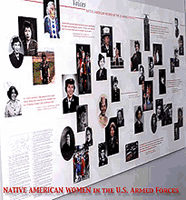
Native American Women's Exhibit Opens at Women's Memorial

By Rudi Williams American Forces Press Service
ARLINGTON, Va., May 27, 2003: Army Spc. Lori Piestewa didn't move a mountain, but her death on the battlefield in Iraq touched a nation and changed a mountain's name.
"Squaw Peak," the Phoenix summit with a name that's offensive and controversial to some, is now "Piestewa Peak" – a hero's name.
Among other tributes to the fallen warrior, Piestewa and five others are featured in "Voices," a new exhibit that opened at the Women's Memorial on May 26 to honor and highlight the contributions of Native American women who serve in the armed forces.
A Hopi Indian, Piestewa was given special honors by tribal representatives from across the country because she was the first service woman killed in action in Operation Iraqi Freedom and the first known Native American service woman known to have been killed in combat.
The 23-year-old soldier from Tuba City, Ariz., died from injuries when her unit, the 507th Maintenance Company, was ambushed on March 23 near Nasiriyah, Iraq, by enemy forces in Iraq. She was promoted posthumously.

Her family and representatives from several nations and tribes – among them Hopi, Navajo, Oneida, Odawa, Chukchansi-Mono, Kumeyaay, and Lakota/Dakota -- were here for the exhibit's unveiling ceremony.
In keeping with Native American heritage and culture, the tribes showered the Piestewas with gifts – blankets, shadow boxes, paintings and eagle feathers.
For example, Vice Chairman Aaron Jones and council members Rob Castro and Craig Martinez from the Table Mountain Rancheria Chukchansi-Mono tribe, presented the Piestewa family four blankets representing life, love, strength and knowledge and reason.
Piestewa's brother, Adam, told the large audience that on Memorial Day everyone should remember and salute all men and women of the armed services and their families "for their tireless efforts and willingness to sacrifice all they have to give in the name of America."
"We remember those innocent souls whose lives were not lost in vain on the morning of Sept. 11th," Piestewa said. "We honor the warriors who have throughout history laid down their lives for their fellow man and preserved the God given right to freedom."
For Hopi tribe chairman Wayne Taylor Jr., Memorial Day has always been set aside as a time to honor fallen veterans. "But it should also be a time to honor all veterans, male, female, reserve, active duty, Hopi, Hispanic, Asian, Caucasian and African-American," he noted. "It should be a time to reflect and be grateful for the few who valiantly defend what we have grown accustomed to.
"It should not be limited to this day, or times of conflict and war, but it should be recognized and observed in some fashion every day," Taylor said. "We need to be daily reminded that it is the contribution of our veterans which gives us the opportunity to live freely."
Taylor said after Lori Piestewa was killed in action, the most frequently asked question on the Hopi reservation was: "Why did Lori join the Army?"
"Many have speculated and derived their own answers," Taylor noted. "Perhaps it was because she followed in the legacy of those before her – her father, a Vietnam veteran, and her grandfather, a World War II veteran.
"Maybe it was because of early ROTC involvement," he said. "Only Lori could give us the answer. Whatever the reason, the question should not be why did she, but rather, why is it strange for her not to?"
The tribal chairman said Piestewa and the other five veterans being honored, as well as many other Native American women who enlist in the armed forces, "joined because of one reason that unites us all: They were Americans," Taylor said, "Americans who simply answered the call of duty. And we are grateful to them and to all of those who continue to do so."
Taylor pointed out that only 111 of the hundreds of Native American women veterans have registered at the Women's Memorial. "I would like to encourage our Native American women veterans to register and be counted for your contribution to this country," Taylor said.
Eagle feathers have long been the symbol of bravery, love, honor, friendship and mystical powers. And that's just what Oneida Indian Daniel King, president of the Wisconsin Indian Veterans Association, presented the family along with a shadow box.
Before making the presentation, King said, "We may indeed put Pfc. Lori Piestewa to rest, but her example of warriorism, her response to the call, her courageous example of honor in the face of horror, brings honor to us all."
King said Piestewa will be mentioned in the annals of Indian heroes throughout the course of time. And it's well deserved.
"There is an old warrior saying: 'When you adorn yourself with the implements of war, you are ready to kill. It is only right then, you must be prepared to die as well,'" King noted. "As Indian people, we know how to face war, we know how to sacrifice, we know how to honor, we know courage. We know how to remember."
The exhibit will remain at the Women's Memorial through
November, American Indian Heritage Month. The memorial is
the nation's only major memorial honoring all service women
-- past, present and future.